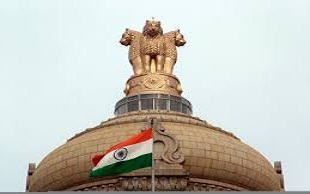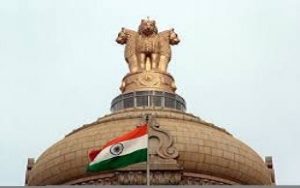The Union Cabinet chaired by the Prime Minister Shri Narendra Modi on December 14, 2016, approved various agreements in areas such as Tourism, energy, Climate Change among others.
Cabinet approves MoU between ISRO and USGS for cooperation in the exchange and use of U.S. Land Remote Sensing Satellite Data
The Union Cabinet chaired by the Prime Minister Shri Narendra Modi on December 14, 2016, approved the Memorandum of Understanding signed between Indian Space Research Organisation (ISRO) and United States Geological Survey (USGS) that was signed on July 9, 2016 at Bengaluru, for cooperation in the exchange and use of U.S. Land Remote Sensing Satellite Data.
- According to the MoU ISRO will receive data from USGS’s satellite, Landsat-7 & 8 in India while USGS will receive data from ISRO’s RESOURCESAT-2 (AWiFS and LISS III) satellite in US.
- The MoU was signed with the mutual interest of both organizations in each others’ satellites.
- Besides, ISRO is also pursuing civilian space cooperation with many US organisations including National Aeronautics and Space Administration (NASA), the National Oceanic and Atmospheric Administration (NOAA) and United States Geological Survey (USGS).
Cabinet Approves Signing MoU between India and Kyrgyzstan to Strengthen cooperation in Tourism
The Union Cabinet, headed by Shri Narendra Modi also gave its approval for signing Memorandum of Understanding between the Ministry of Tourism, Government of the Republic of India and Ministry of Cultural, Information & Tourism of the Government of the Kyrgyzstan Republic for strengthening cooperation in the field of Tourism.
- The MoU will mutually benefit both the countries as each country will frame development and promotion policies for tourism for the economic development of two nations. Besides, the MoU will also increase the number of tourists of both the countries travelling in each others’ nation.
The salient objectives of the MoU include:
- Expanding bilateral cooperation and exchanging information related to the tourism sector
- Encourage cooperation between tourism stakeholders of both countries including Hotels and Tour operators.

- Exchange various programmes for cooperation in Human Resource Development.
- Investment in the Tourism and Hospitality sectors.
- Promote two way tourism by exchanging visits of Tour Operators, Media, Opinion Makers.
- Exchange experiences in the areas of promotion, marketing, destination development and management of safe & honourable and sustainable tourism.
- Participate in travel fairs /exhibitions in each other’s country
Cabinet approves India’s Climate Change Negotiation at COP
The Union Cabinet on December 14, 2016, gave its ex-post facto approval to India’s approach to Climate Change Negotiations at the Conference of Parties (COP) to the United Nations Framework Convention on Climate Change (UNFCC), held in Marrakesh, Morocco on November 7-18, 2016.
- The aim of approving the Climate Change Negotiations at the COP is to safeguard the interest of poor and vulnerable groups of the society in the country.
- Growth and development of a country is based on the Greenhouse Gas emissions. Thus development space for India needs to be preserved of loss and damage, while combating the ill-effects of the climate change along with addressing the adaptation needs of the country.
Cabinet Approves Replacing Major Port Trusts Act, 1963 by the Major Port Authorities Bill, 2016.
The Union Cabinet, chaired by the Prime Minister, Shri Narendra Modi approved the proposal of Ministry of Shipping to replace the Major Port Trusts Act, 1963 by the Major Port Authorities Bill, 2016.
- The new Act will empower the Major Ports full autonomy in decision making enabling them to perform with greater efficiency and modernize the Institutional structure of Major Ports.
- The new Major Ports Authority Bill, 2016 would help to impart faster and transparent decision making that will help in better project execution capability.
The features of new Major Ports Authority Bill
- The number of sections in the new Bill has been reduced to 65 from 134 by eliminating overlapping and obsolete Sections compared to the Major Port Trusts Act, 1963
- According to the new Bill, Board of Port Authority will comprise of 11 members from the present 17 to 19 Members.
- Members will include representative of the State Government in which the Major Port is situated, Ministry of Railways, Ministry of Defence and Customs, Department of Revenue, Government Nominee Member and Member representing the employees of the Major Ports Authority
- Port Authority has been given powers to fix tariff which will act as a reference tariff for purposes of bidding for PPP projects. The Board of the Port Authority has also been delegated the power to fix the scale of rates for other port services and assets including land.
- An independent Review Board has been proposed to look into disputes between ports and PPP concessionaires, to review stressed PPP projects and suggest measures to revive such projects and to look into complaints regarding services rendered by the ports/private operators operating within the ports would be constituted.
- The new Bill empowers the Board to make its own Master Plan related to construction within port limits such as Pipelines, Telephones, Communication towers, electricity supply or transmission equipment.
Cabinet gave Ex-Post Facto Approval & Renewal of MoU between ICAI and CBFS
The Union Cabinet chaired by the Prime Minister Shri Narendra Modi has given its ex-post facto approval of the MoUs signed between the Institute of Chartered Accountants of India (ICAI) and College of Banking and Financial Studies (CBFS), Oman in 2008 and 2011 as well as the renewal of Memorandum of Understanding (MoU).
- ICAI has a strong membership base of over 6000 members in the Middle East region and the MOU aims at providing assistance to CBFS by admitting Omani Nationals to the membership of ICAI.
- The aim is to work together to develop a mutually beneficial relationship in the best interests of members, students and the institutes.
- The MoU is also expected to provide an opportunity to the ICAI members to expand their professional knowledge base and ICAI is expected to become an entity which aids and strengthens professional capabilities of Omani nationals.
- The MoU is expected to generate Goodwill of India, Indian citizens and Indian Chartered Accountants in the Sultanate of Oman.
- The MoU is expected to make a positive impact for the Indian Chartered Accountants currently working in Oman and other markets and for those Indian professionals who intend to move to Oman for pursuing their profession there. As such, enhanced employment opportunities are expected to be created for Indian professionals in the Sultanate of Oman.
Cabinet Approves Signing Revised Air Services Agreement between India and Nigeria
The Union Cabinet chaired by the Prime Minister Shri Narendra Modi has given its approval for signing of the revised Air Services Agreement (ASA) between India and Nigeria which was signed on 31th January, 1978.
- The revised version of the Agreement will be as per latest International Civil Aviation Organisation (ICAO) pattern, based on the latest developments in civil aviation sector and with an objective to improve the air connectivity between the two countries.
- The revised Agreement with strengthen the civil aviation relations between India and Nigeria and has the potential to encourage greater trade, investment, tourism and cultural exchanges between the two countries.
The features of the revised Air Services Agreement
- Both countries shall have the right to designate one or more airlines. The designated airlines of either country shall have the right to establish offices in the territory of the other country for the promotion and sale of air services.
- Both sides agreed to operate any number of all Cargo services between each other’s territory with any type of aircraft with full 3rd, 4th and 5th freedom traffic rights.
- The designated airline will be free to decide tariffs in respect of the agreed services at reasonable levels based on the commercial considerations.
- The designated Airline of each party can enter into cooperative marketing arrangements with the designated carriers of same party and other party.
- As per new provision, each side shall be entitled to operate a maximum of 7 frequencies per week in each direction on the routes specified in the Route Schedule.
Besides, the new ASA also has the provisions relating to Revocation or Suspension of Operating Authorization, Principles governing operations of agreed services, Routing Flexibility, Commercial Opportunities, Aviation safety, Aviation security related clause etc.






